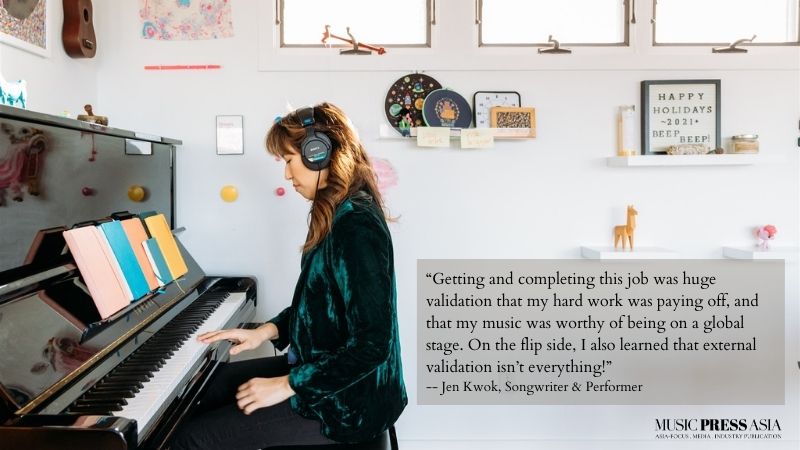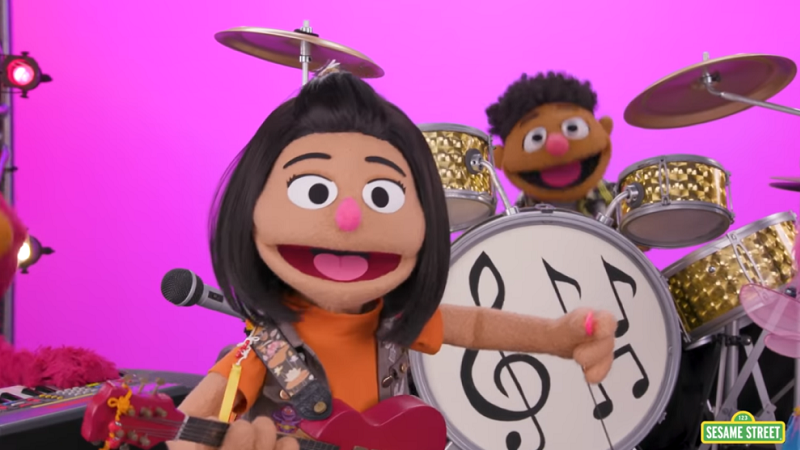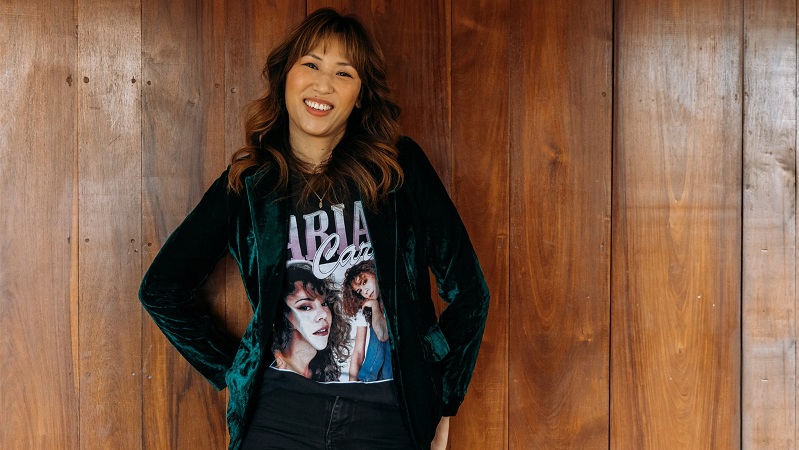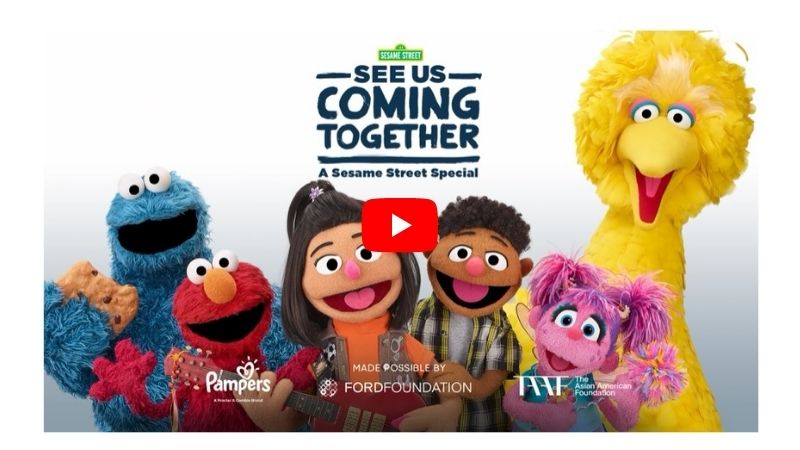Jen Kwok, on representing the Asian diaspora in New York
Written by ABR on 15/04/2022
Jen Kwok is a Chinese-American writer and performer from Southern California who is currently based in NY’s Hudson Valley. Armed with a velvety voice and razor-sharp wit, Jen combines music and comedy to create a refreshing spin on the hidden depths of our inner lives. Most recently, Jen composed the song, “See Us Coming Together”, for Sesame Street and the Macy’s Thanksgiving Day Parade. Not only is she a creator with a musician’s soul, but undoubtedly also a healer of hearts with a comedian’s delivery.
In this interview, Jen Kwok shares her experience collaborating with Sesame Street, challenges writing for a new children’s character, and Asian representation in one of America’s top educational programs dedicated to children.
Q1: Dear Jen! Greetings from Southeast Asia. It’s certainly not an everyday topic to hear that an Asian character has been introduced into the Sesame Street community. How did you land creative work with Sesame Street? What experience do you need prior to accepting this job?
A producer friend of mine was working on the “See Us Coming Together” special, and passed my name along to the Music Director of Sesame Street. The Asian American entertainment network is a small and supportive world, so we are constantly looking out for each other and recommending each other for stuff when the opportunity arises. It’s such a hard and mysterious industry, and in my experience, you just keep doing what you love and getting better at it. You build a reputation, forge relationships along the way, and when the “right” opportunity comes along that aligns with your skills and talents, the people you’ve been fortunate enough to work with in the past will think of you. This is how I think when I’m looking to hire others as well.
In terms of qualifications, I think it was almost a no-brainer that an Asian woman should write this song for an Asian female character. So having been an Asian girl who faced racism in America and currently being the mom of a young bi-racial Asian kid were crucial to my understanding of what this song needed to be. Musically, I’ve built a career as a comedic singer-songwriter who makes pop songs about difficult or uncomfortable topics. Having a comedy background also means I’m used to fitting a lot of complex ideas–and syllables–into a song, while also staying simple, catchy, efficient, and lighthearted. These are all must-haves when writing for kids.
Q2: Have you taken any courses in music prior to this?
I studied classical piano from childhood through college, although I did not get a degree in it. Early on in my career I also took musical comedy improv classes, which taught me how to let go of judgment, be silly, and think on my feet. However, the bulk of my experience with songwriting and composing has been self-taught through trial and error. Since I don’t confine myself to any one genre, studying and trying to emulate the work of all different artists and musicians has helped me tremendously. This has allowed me to understand a variety of different styles, forms and perspectives. That said, probably my greatest education has been from the School of Mariah Carey. Her unique combination of complex melodies, luscious harmonies and huge SAT words is absolutely no joke.

Q3: Nevertheless, it must have been based on the fact that you’ve produced prominent results prior. After your chat with the music director at Sesame Street, specifically, what was actually required of you?
This was a very specific job because the script had already been written, so the song was the culmination of the story and the character’s journey. There were some lyrical themes and ideas already written into the script, so my job was to expand on that and make it a cohesive song! We also knew there was a big chance this would be performed at the Macy’s Thanksgiving Day Parade (which it was!), so the goal was to make it as catchy, celebratory, and parade-worthy as possible.
Q4: Where do you find inspiration to write music and lyrics for a character like Ji-Young, especially when it is an educational piece for kids? What elements do you particularly think about especially since embracing motherhood?
Whenever I write I try to go as close to the source as possible. For this project, there were three things: 1) the script, 2) my own experience as a young Asian girl growing up in America and 3) what I hope to share with my son and all the other Asian kids growing up in this generation and beyond.
When you’re hired for a creative job, your role is to support the bigger picture. I spent years as a professional actor as well, so script analysis and adhering to that roadmap is always the jumping-off point. I took specific things that happened in Ji-Youngs journey to summarize and reiterate what she and the audience learned from the show. The process was really unlocked when I connected with my own inner child and wrote from the perspective of a 7-year old Asian girl.
As a mom, I also tried to think about what specific messages I would want my child and other Asian kids to hear. I wanted to write a song that would be empowering and comforting. I tried to imagine the song that caregivers and children could sing in the car to help themselves feel better after an experience involving race, or just something to simply uplift and celebrate themselves.

Ji-Young is introduced in ”See Us Coming Together: A Sesame Street Special premiered on Nov 25, 2021 on PBS & HBOMax’]
Q5: How profound of an impact do you think the song has had since its release on the program? What are some of the responses you’ve heard since? Do you have a favorite excerpt you’d wish to share with us that you find most influential?
I think the “See Us Coming Together” special, the song and especially the character of Ji-Young have all added to Asian representation in the mainstream. Sesame Street is all over the world, so to know that kids in Germany and Japan are also getting this message is huge. The response from the Asian American community itself has been overwhelming—so many of us finally feel seen and heard on some level. A whole generation of kids, and the ones that come after, will also be able to grow up with a bit more recognition and visibility from an early age. There are so many adults my age who cried because they finally felt the sense of belonging they had always yearned for. But my favorite reaction was the little girl who dressed up as Ji-Young, even before the episode aired! The excitement of being able to look up to someone who looks like you is so special and irreplaceable.
Q6: How has this song been equally special and challenging for you at the same time?
This song has been so special to me because of its meaning, timing, and the number of people who have seen it. It is an incredible honor to be part of this cultural moment and to write a song for the Asian diaspora. The hardest part is, of course, the naysayers who are critical of even bringing up the topic of race to children. It’s a tough thing to talk about, and that’s why using music and entertainment is a great way of approaching such issues. As an idealist, I find a lot of comfort in knowing that the true impact of this song is infinite and has yet to be seen. The children who listen and sing along to this will hopefully feel a sense of pride and belonging that extends to the rest of their lives.
Q7: Is this song also a dedication to the kid you once were?
I really tried to write the song that I wish I had when I was a young girl. This is definitely for the kid who was excluded at recess and made fun of for her stinky lunch and physical features. I had to work hard to accept myself for who I am and to fight for my own voice. I know this continues to be a struggle for so many immigrants, refugees and descendants from Asian countries. This song is dedicated to everyone who’s had to go through these struggles–at any age.
Q8: Why do you think that it’s important that love should rise above hate?
Love is a nurturing energy that is limitless in its potential. Hate is destructive, period. Love has so very many different forms of expression in nature, relationships, creativity, caretaking, and the arts. As human beings, it is truly one of the greatest gifts to be able to experience and explore love in all its many forms. This is the way we share and heal. This is the way that life goes on.

Q9: Musicians aren’t the savviest business people in the creative world. Tell us how your degree in Bachelor of Science in Business, with a triple concentration in Finance, Marketing & Management Information Systems has helped you move forward as a songwriter and music producer?
OK, perhaps I’m not the most natural business person, but some combination of being curious about business and wanting to be a practical daughter of Asian immigrants lead me to study business management, so I’m glad for that! Having a business background has definitely helped me be more organized, think strategically, and understand how to present myself in a professional manner. Creatives can sometimes be afraid of or naive about the business aspect, or they simply don’t want to deal with it. For me, having a greater understanding of the ins and outs of different types of businesses has empowered me to take greater control of my career. Most importantly, having worked in the business and non-profit world, I very much know the difference between having a good boss or a bad boss and what it’s like to work in a good, mediocre, or broken system. Knowing all that has helped me understand how to navigate different situations, and to understand what kind of boss or collaborator I want to be.
Q10: What have you learned from this experience?
The first thing I learned is the power of not giving up. I know it’s cliche, but I’ve been in this industry for a really long time without much conventional “success”. Getting and completing this job was huge validation that my hard work was paying off, and that my music was worthy of being on a global stage. On the flip side, I also learned that external validation isn’t everything! At the end of the day, the excitement will always blow over and jobs will come and go. It’s my undying passion for creating beauty and meaning in this world that will stay with me and continue determining my trajectory.
Q11: Tell us about your upcoming project(s) for 2022 or in the near future and why you’ve chosen them?
I have a lot of new stuff coming out in 2022! My producing partner, Jody Shelton, and I created music for the new Peloton podcast, Fitness Flipped. That was a fun project that was focused exclusively on music and vibe, so it was a great contrast to the Sesame Street song. We also did work for an upcoming cross-cultural rom-com project that’s a ton of fun! Most of the projects I choose appeal to my love of variety, as well as their ability to inject new perspectives and positivity into the world. I love working for companies that actively champion diversity and social justice through their content. Currently, I am also working on my own new music, which is a more experimental and lo-fi project that’s meant to support healing, mindfulness, and self-regulation. The most exciting thing for me is to keep pushing and finding new directions. That’s what feeds my soul and keeps me in love with the creative process.
To contact Jen Kwok or the latest update on her works, visit the official website here. Watch and listen to “See Us Coming Together” below.
All profile photography of Jen Kwok is credited to Amy Nghe. Click here for her official website.

The post Jen Kwok, on representing the Asian diaspora in New York appeared first on Music Press Asia.



 ABR Group
ABR Group